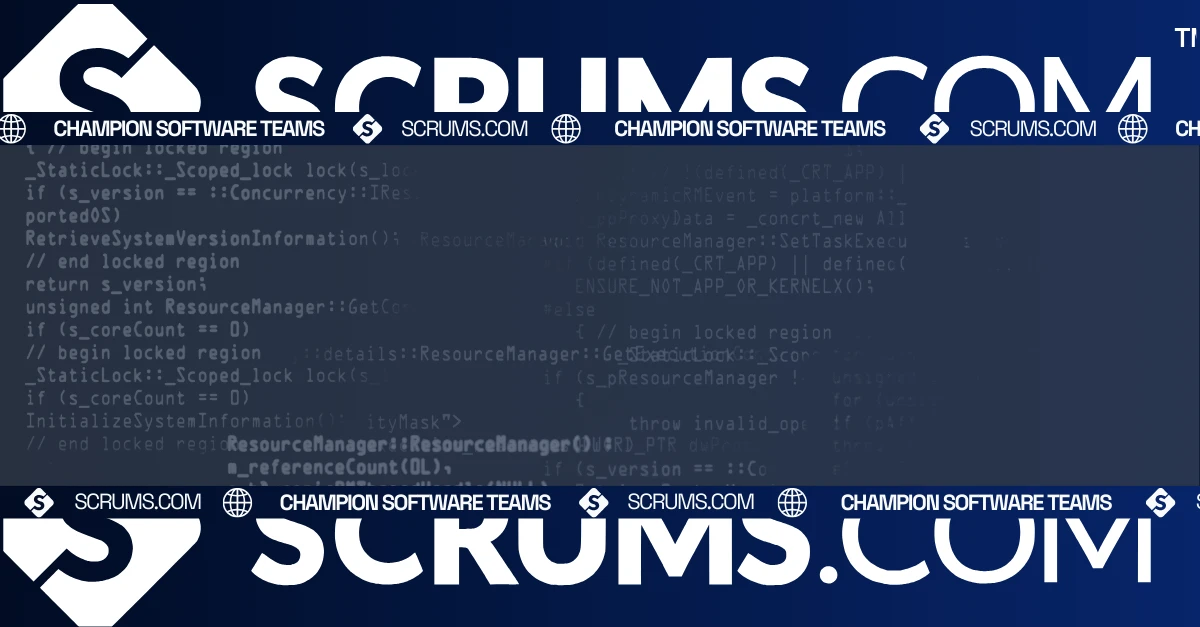Hire Shell software developers
Scrums.com's 10,000+ software developer talent pool includes experts across a wide array of software development languages and technologies giving your business the ability to hire in as little as 21-days.







































Years of Service
Client Renewal Rate
Vetted Developers
Ave. Onboarding
Africa Advantage
Access world-class developers at 40-60% cost savings without compromising quality. Our 8,500+ talent pool across Africa delivers enterprise-grade engineering with timezone overlap for US, UK, and EMEA markets.
AI-Enabled Teams
Every developer works within our AI-powered SEOP ecosystem, delivering 30-40% higher velocity than traditional teams. Our AI Agent Gateway provides automated QA, code reviews, and delivery insights.
Platform-First Delivery
Get real-time development visibility into every sprint through our Software Engineering Orchestration Platform (SEOP). Track velocity, blockers, and delivery health with executive dashboards.
Align
Tell us your needs
Book a free consultation to discuss your project requirements, technical stack, and team culture.
Review
We match talent to your culture
Our team identifies pre-vetted developers who match your technical needs and team culture.
Meet
Interview your developers
Meet your matched developers through video interviews. Assess technical skills and cultural fit.
Kick-Off
Start within 21 days
Developers onboard to SEOP platform and integrate with your tools. Your first sprint begins.
Don't Just Take Our Word for It
Hear from some of our amazing customers who are building with Scrums.com Teams.
Flexible Hiring Options for Every Need
Whether you need to fill developer skill gaps, scale a full development team, or outsource delivery entirely, we have a model that fits.
Augment Your Team
Embed individual developers or small specialist teams into your existing organization. You manage the work, we provide the talent.
Dedicated Team
Get a complete, self-managed team including developers, QA, and project management – all orchestrated through our SEOP platform.
Product Development
From discovery to deployment, we build your entire product. Outcome-focused delivery with design, development, testing, and deployment included.
Access Talent Through The Scrums.com Platform
When you sign-up to Scrums.com, you gain access to our Software Engineering Orchestration Platform (SEOP), the foundation for all talent hiring services.
View developer profiles, CVs, and portfolios in real-time
Activate Staff Augmentation or Dedicated Teams directly through your workspace

Need Software Developers Fast?
Deploy vetted developers in 21 days.
Tell us your needs and we'll match you with the right talent.
What is Shell Scripting and Why It Matters for Your Business
Shell scripting is a powerful method of automating tasks in Unix-based systems such as Linux. It involves writing scripts using command-line interpreters like Bash, KornShell (KSH), and Z Shell (Zsh), enabling developers to automate repetitive tasks, manage system configurations, and perform complex system administration tasks efficiently. According to the 2023 Linux Foundation report, Linux remains the leading operating system for servers, with over 90% of cloud infrastructure and enterprise servers running on Linux.
Hiring a Shell developer is crucial for businesses that rely on Linux or Unix systems for their operations. From automation to system administration and custom Bash scripting, Shell developers provide the expertise needed to streamline workflows, improve system reliability, and reduce manual intervention.
Key Benefits of Hiring a Shell Developer
Hiring a Shell developer offers numerous advantages, especially for businesses focused on Linux automation, server management, and system administration. Here are some key benefits:
- Efficient System Automation: Shell developers can automate routine tasks such as backups, software installations, and log management, reducing the need for manual intervention and minimizing human error. This results in increased productivity and better system reliability.
- Improved System Administration: Shell developers are skilled in managing system configurations, monitoring server health, and performing maintenance tasks. This expertise is essential for businesses that require robust system administration to maintain uptime and performance.
- Cost-Effective Solutions for Server Management: By leveraging Shell scripting, developers can create custom scripts to manage servers efficiently. This eliminates the need for expensive third-party software, resulting in cost savings for businesses.
- Enhanced Server Automation for DevOps: In DevOps environments, Shell developers play a key role in automating CI/CD pipelines, managing containers, and orchestrating cloud infrastructure. Their expertise helps businesses achieve faster deployments and more reliable operations.
- Flexibility and Adaptability Across Environments: Shell scripts are highly adaptable and can be used across various Unix-based environments, including Linux, macOS, and BSD. This flexibility makes Shell scripting an invaluable skill for businesses that need to manage heterogeneous IT environments.
Core Competencies of a Skilled Shell Developer
When hiring a Shell developer, it’s essential to ensure they possess the necessary skills and expertise to build and optimize effective automation scripts and system management solutions. Key competencies include:
- Proficiency in Unix/Linux Shell Environments: A skilled Shell developer should have a deep understanding of Unix/Linux systems and Shell environments like Bash, KornShell (KSH), and Z Shell (Zsh). They should be capable of writing scripts that automate complex tasks and enhance system performance.
- Experience with System Administration and Automation: Shell developers should be experienced in system administration, including managing users, permissions, and network configurations. They should know how to automate routine tasks, perform backups, and manage server processes efficiently.
- Knowledge of Scripting Languages and Tools: A good Shell developer should be familiar with other scripting languages and tools, such as Python, Perl, and Awk, that are often used alongside Shell scripting for more advanced automation and data processing tasks.
- Understanding of DevOps Practices and Tools: Shell developers must have experience in DevOps practices, including continuous integration, continuous deployment (CI/CD), and infrastructure as code (IaC). They should know tools like Ansible, Puppet, and Docker to automate deployments and manage cloud infrastructure.
- Security and Optimization Expertise: A competent Shell developer should be skilled in writing secure Shell scripts that protect against common vulnerabilities like command injection. They should also be adept at optimizing scripts for performance to ensure efficient system operation.
How Shell Scripting is Used in Modern IT Environments
Shell scripting remains an essential skill in modern IT environments due to its versatility, efficiency, and ability to automate complex tasks. Here are some common applications of Shell scripting:
- Linux Automation and System Maintenance: Shell scripting is widely used for automating repetitive tasks in Linux environments, such as file management, process monitoring, and system backups. Businesses like Facebook, Google, and IBM rely on Shell scripting to manage their vast server infrastructures efficiently.
- Custom Bash Scripts for DevOps and CI/CD Pipelines: Shell scripting is crucial in DevOps practices for automating CI/CD pipelines, managing configuration files, and deploying applications. Shell scripts are often used to automate the steps in software builds, tests, and deployments, reducing deployment times and increasing reliability.
- Server Automation and Management: Shell developers use scripts to automate server management tasks, including starting and stopping services, managing network configurations, and monitoring server health. This is critical for maintaining the uptime and stability of servers in production environments.
- Unix Shell Scripting for Data Processing and ETL: Shell scripts are commonly used to automate data processing and ETL (Extract, Transform, Load) tasks in data engineering pipelines. This is especially useful in environments that require processing large volumes of log data or interacting with databases and cloud storage.
- Security Automation and Compliance: Shell scripting is also used for security automation, such as monitoring security logs, managing firewall rules, and enforcing compliance policies. Shell developers can automate security checks and alerts to ensure the system is protected from potential threats.
Shell Scripting vs. Other Scripting Languages: When to Choose Shell for Your Project
Choosing the right scripting language is critical to the success of your automation and system management projects. Here’s how Shell scripting compares to other scripting languages like Python, Perl, and PowerShell, and when it might be the best choice:
- Efficiency in Unix/Linux Environments: Unlike PowerShell, which is more suited for Windows environments, Shell scripting is the native language for Unix/Linux systems. This makes it the go-to choice for Linux automation, system administration, and server management tasks.
- Lightweight and Easy to Execute: Shell scripts are lightweight and require no additional installations or dependencies, unlike Python or Perl scripts. This makes Shell scripting ideal for environments where simplicity and minimalism are preferred.
- Ideal for Low-Level System Tasks: While Python and Perl are powerful for general-purpose scripting, Shell excels at low-level system tasks like process management, user management, and system monitoring. This makes it more suitable for system administrators and DevOps engineers who need to interact directly with the operating system.
- Rapid Prototyping and Development: Shell scripting offers rapid prototyping and development capabilities due to its concise syntax and direct access to system utilities. This enables developers to quickly write and execute scripts for automation and management tasks.
- Integration with Unix Utilities: Unlike other scripting languages, Shell scripts can seamlessly integrate with a wide range of Unix utilities like awk, sed, grep, and cron. This makes Shell scripting highly versatile for performing complex text processing, data manipulation, and scheduled tasks.
The Future of Shell Scripting Development: Trends and Insights
Shell scripting continues to be a cornerstone of IT automation and system management. Here are some trends highlighting its ongoing relevance:
- Increasing Demand for Linux Automation: As Linux continues to dominate cloud and enterprise server environments, the demand for skilled Shell developers is on the rise. Shell scripting is becoming even more critical for businesses that rely on Linux automation for their IT operations.
- Integration with Cloud-Native and DevOps Practices: Shell scripting is increasingly being integrated with cloud-native development and DevOps practices. Shell scripts are often used to automate cloud infrastructure provisioning, manage containers, and orchestrate multi-cloud environments, driving efficiency and scalability.
- Focus on Security and Compliance Automation: With the rise in cyber threats, Shell developers are focusing on automating security and compliance tasks. This includes automating security scans, managing firewall rules, and monitoring system logs for suspicious activity.
- Enhanced Tooling and Ecosystem Growth: The Shell scripting ecosystem continues to grow with new tools, libraries, and frameworks that enhance productivity. Tools like ShellCheck for script analysis and Bats (Bash Automated Testing System) for testing are helping developers write more secure and reliable Shell scripts.
- Adoption in Edge Computing and IoT Environments: Shell scripting is finding its place in edge computing and IoT environments where lightweight, efficient automation is needed. Shell scripts are being used to manage devices, automate tasks, and process data in resource-constrained environments.
How to Hire the Right Shell Developer for Your Needs
Finding the right Shell developer is essential to the success of your automation and system management project. Here’s how to get started:
- Define Your Project Requirements: Clearly outline your project’s scope, technical requirements, and desired features. This will help you identify developers with the right skills and experience.
- Look for Relevant Experience: Choose developers with a proven track record in Shell scripting development, particularly those who have successfully built and optimized automation scripts and server management solutions similar to yours. Experience with Linux environments and system administration is highly valuable.
- Evaluate Technical Skills: Ensure the developer has strong Shell scripting skills, experience with Unix/Linux systems, and proficiency in building secure, efficient, and scalable automation solutions.
- Assess Communication and Collaboration: Effective communication is key to a successful project. Your Shell developer should be able to articulate ideas clearly and collaborate effectively with your team, especially when building complex, system-level automation solutions.
- Consider Freelancers or Development Agencies: Depending on the scale of your project, you may opt to hire a freelance developer or work with a development agency specializing in Shell scripting. Each option has its advantages, so choose based on your project’s needs and budget.
Find Related Software Developer Technologies
HTML developers
Scala developers
Caliiburn Micro developers
.NET Core developers
Adobe PhoneGap developers
AngularJS Developers
Apache Kafka developers
ASP.NET Razor developers
Explore Software Development Blogs
The most recent trends and insights to expand your software development knowledge.















